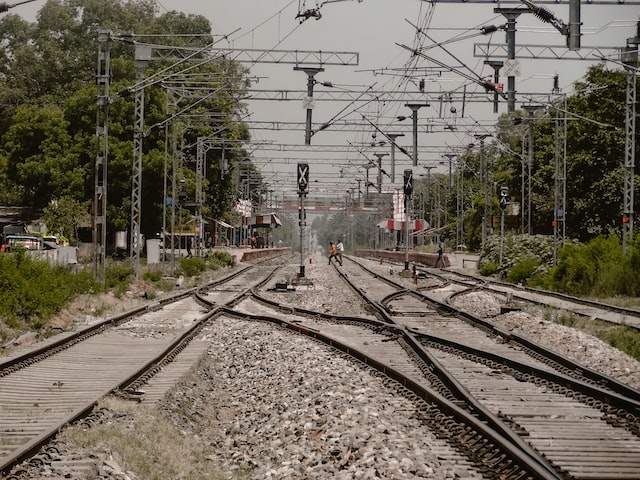Americans face the possibility of a nationwide train strike at just about the worst time—right in the middle of the holiday shopping and travel season. The threat is sparking calls for Congress to intervene—right in the middle of its busy lame duck session ahead of a power shift in the new year.
Train Worker Walkout Could Happen Mid-December
A tentative rail worker deal in September was hailed by President Biden, who helped broker the deal along with Labor Secretary Marty Walsh, as “a win for tens of thousands of rail workers who worked tirelessly through the pandemic.”
And Dennis Pierce, President of the Brotherhood of Locomotive Engineers and Trainmen union, said the negotiated attendance rules it offered was a “quality of life issue that we have been trying to get for our members since the bargaining round started.”
But two months later, rank-and-file members of four out of the 12 unions involved aren’t satisfied. They’ve voted “no” on its ratification, which has started the countdown to a potential industry-wide strike at 12:01am ET on December 9—smack in the middle of the holiday shopping and travel season.
How a Rail Strike Could Upend the Economy
“At a week, you see real damage in the U.S. economy,” economist Patrick Anderson said back in September. His organization, Anderson Economic Group, conducts impact estimates on work stoppages.
America’s railroads carry roughly one-third of the nation’s freight, measured by the distance traveled and the weight of the cargo, according to the Bureau of Transportation Statistics. And there’s no real alternative should the trains stop running.
So, if a strike lasts even just one week, it could mean spoiled crops, a choked off supply of new cars and empty store shelves.
Other work forces could be impacted as well, as commutes are snarled and jammed. And down the road factory workers may suffer temporary layoffs because of supply shortages.
Gas Prices Could Soar
It could also send gas prices soaring again due to cut-off supply. Moreover, consumers would bear the brunt of the cost if refineries shut down either because they can’t get the ingredients they need to make fuel or because railroads aren’t available to haul away byproducts like sulfur.
And just about all ethanol that goes into gasoline moves by rail. Without it, gasoline wouldn’t be compliant with some environmental regulations, and then “you have real problems,” Tom Kloza, Global Head of Energy Analysis for OPIS, tweeted in September. He has estimated that a lack of ethanol could increase the cost of a gallon of gas by about 16 cents due to a loss in tax breaks.
Retailers and Delivery Services Express Concern
Needless to say, retailers and delivery services in particular are not thrilled with the seasonal timing of this potential strike.
Jon Gold, Vice President of Supply Chain and Customs Policy at the National Retail Federation, told CNBC, “A rail strike in December would potentially impact holiday goods,” along with shipments for spring merchandise that retailers are already starting to bring in.
He added, “We hope the freight railroads and rail labor organizations will resolve the contract issue without engaging in a strike or disruption. Otherwise, Congress must quickly intervene to ensure a disruption does not occur.”
And a UPS spokesperson said, “We encourage an immediate resolution that is beneficial to all parties and we believe that agreements can be reached. A railway strike would cause unnecessary impacts on the U.S. economy and consumers. UPS will flex our integrated smart logistics network to serve our customers.”
Could the Standoff Disrupt Congress’ Lame Duck?
Retailers aren’t the only ones looking for Congressional intervention. Negotiations have resumed between the railroads and union leaders but reports are the impasse is deep.
Labor leaders expect that Congress would vote to block a strike and force through the deal bartered by Biden. After that agreement was reached, Speaker Nancy Pelosi (D-CA) said that the House had prepared legislation to prevent a walkout.
That leaves the unions complaining that the railroads refuse to take part in serious negotiations because they’re confident that Congress will intervene to avoid economic catastrophe.
“The ball is now in the railroads’ court. Let’s see what they do. They can settle this at the bargaining table,” SMART-TD union President Jeremy Ferguson said. “But, the railroad executives who constantly complain about government interference and regularly bad-mouth regulators and Congress now want Congress to do the bargaining for them.”
On the other side of the table, the Association of American Railroads (AAR) President and CEO Ian Jefferies said in a statement, “Let’s be clear, if the remaining unions do not accept an agreement, Congress should be prepared to act and avoid a disastrous $2 billion a day hit to our economy.”
And the standoff is happening as the Democratic-led 117th Congress is knee-deep in a busy lame duck session. Senate Majority Leader Chuck Schumer (D-NY) had already slated a full agenda before year’s end—not least of all, keeping the government from going broke, which it does on December 16 if Congress doesn’t vote in favor of a $1.5 trillion+ funding package.
Sens. Richard Burr (R-NC) and Roger Wicker (R-MS) introduced rail worker legislation in September that drew bipartisan interest. It would enact terms put forth by a Presidential Emergency Board that Biden had created in July and staffed with labor-law experts. But now that the midterm elections are over, there’s a question of whether House Democrats will agree to it.


